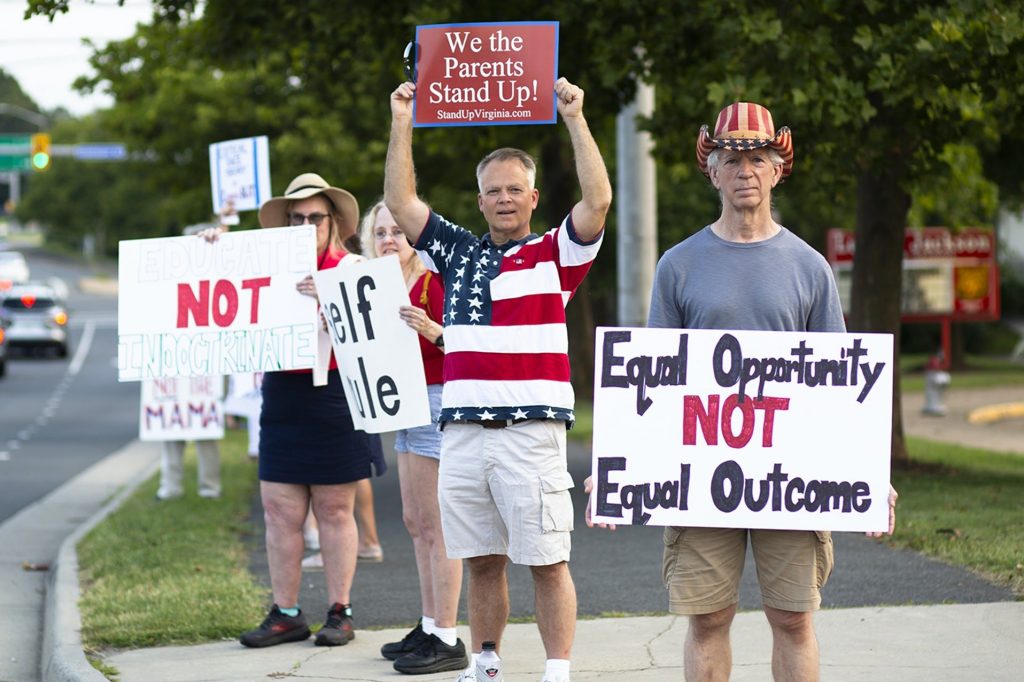[A BRIEF HISTORY] “The GOP Has Revived Its Obsession With Parents’ Rights”

Republicans tried—and failed—to run on parental grievances back in the 1990s. Will this time be different?

Photo by Orlando Pinder for The New Republic On July 15, protesters against critical race theory rallied outside Luther Jackson Middle School in Falls Church, Virginia.
In early November, in a crushing defeat for the Democrats, Terry McAuliffe lost his bid for governor of Virginia to private equity executive Glenn Youngkin, a Trump-friendly Republican. Youngkin ran on familiar GOP themes—job creation, taxes, crime—and McAuliffe, a centrist who had served as governor of the state between 2014 and 2018, was expected to skate to victory. But when the Democrat proclaimed on the debate stage that he didn’t think parents should be telling schools what to teach, Youngkin pounced. In the waning weeks of the campaign, the GOP candidate made parents’ rights his central cause. Voters responded with alacrity.
In Youngkin’s upset win, the GOP saw its path to forever rule. And it was lined with angry parents. In his election-night letter, dashed off as votes were still being counted, House Minority Leader Kevin McCarthy pledged to roll out a “Parents’ Bill of Rights” as a central plank of the GOP’s efforts to retake Congress in 2022 and the White House in 2024. Josh Hawley, who aspires to occupy that residence, announced his own rights bill, one that would “turn back efforts to shut parents out of their children’s education.” The Wall Street Journal made the new cause official: The GOP was now the “Parents’ Party.”
Republicans’ newfound passion for America’s parents has a straightforward explanation. As the Virginia victory demonstrated, parental rage can be mined for electoral gold. And right now parents have plenty of reasons to be unhappy. Pandemic schooling, with its arduous, unpredictable schedule of shutdowns and mandates, is in its third year, with no end in sight. Meanwhile, school districts are fumbling as they grapple with an array of contentious issues, including the appropriate way to teach about racism and how best to accommodate the needs of an increasingly diverse student body. The result has been an incendiary debate about not just what schools teach and how they’re run but whose voice really matters in those decisions.
This is not the first time parents’ grievances have been exploited for politics’ sake. Three decades ago, the GOP and a familiar line-up of conservative groups coalesced behind the same banner of parental rights. The cause even made it into the GOP’s Contract With America, the ambitious legislative agenda laid out by conservatives en route to flipping Congress in 1994. When Pat Buchanan launched his 1996 presidential bid, he declared himself the candidate of parents. “You have my solemn word,” Buchanan intoned on the stump in New Hampshire, a state he went on to win. “I will shut down the U.S. Department of Education, and parental right will prevail in our public schools again.”
And yet within a few years, the issue came to be seen as a stalking horse for the religious right’s agenda of dismantling public education, and it fizzled with surprising speed. Now, as conservatives once more wave the banner of parents’ rights, the sudden demise of a potent political issue 30 years ago offers some valuable lessons
ORIGINAL Published to The New Republic on DEC. 09, 2021



